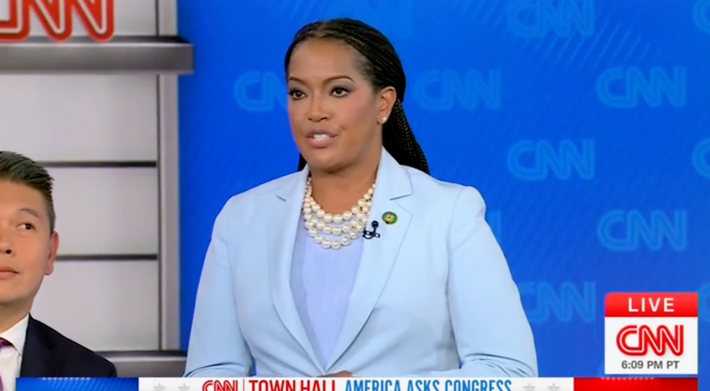Democratic Congresswoman Jahana Hayes is now expressing regret for voting in favor of the Laken Riley Act, a law aimed at detaining criminal illegal aliens and holding the federal government accountable for failures in immigration enforcement. Hayes, who originally supported the bill due to its provisions protecting law enforcement and public safety, now says she has second thoughts—accusing the Trump administration of using the law to “terrorize” legal immigrants.
The Laken Riley Act, signed into law by President Donald Trump earlier this year, mandates the detention of illegal aliens who are charged or convicted of crimes like theft, assaulting police officers, or other serious offenses. It also grants states the authority to sue the Department of Homeland Security if they believe harm has been caused by the Biden-era sanctuary and catch-and-release policies that Trump has moved to dismantle.
Hayes, speaking during a CNN town hall, said she initially voted for the law to support law enforcement. “As I’ve thought about it over the last couple of months, I probably would have voted differently. It’s a vote that I regret,” she admitted. She went on to claim the Trump administration is “terrorizing” immigrant communities—though she offered no evidence that legal immigrants are being unfairly targeted.
Her comments have sparked backlash among those who support the law, particularly in light of the tragic death of Laken Riley, a Georgia college student brutally murdered by an illegal alien who had been repeatedly released by authorities despite prior arrests. The legislation was named in her honor.
Supporters of the law argue it’s a common-sense measure to prevent such tragedies and ensure that dangerous individuals are not allowed to remain in the country due to bureaucratic inaction or political gamesmanship. “This law is about protecting Americans first,” said one Republican lawmaker. “If someone is here illegally and commits a crime, they don’t belong on our streets—they belong in custody.”
Critics of the law, largely from the far left and activist organizations, have claimed it could lead to overreach or confusion for legal immigrants. They’ve floated concerns about “indefinite detention” for minor offenses, despite the law’s clear focus on criminal aliens and those posing a public safety risk.
Hayes’ flip-flop reflects a growing divide within the Democratic Party, as some members struggle to reconcile their support for law enforcement and public safety with pressure from open-border activists and far-left immigration groups. While her vote was originally seen as a bipartisan signal of support for commonsense enforcement, her reversal now aligns her with the same wing of her party that has defended sanctuary cities and opposed Trump’s immigration crackdowns at every turn.
The White House has stood firm in defending the law. “This administration is putting the safety of American citizens above the demands of radical activists,” said one senior official. “We will enforce the law, secure the border, and ensure that states have the tools they need to fight back against the federal failures that have cost lives.”
For the families impacted by crimes committed by illegal aliens, the Laken Riley Act isn’t controversial—it’s necessary. And while some Democrats may be regretting their votes, the American people won’t soon forget who stood with victims, and who caved to political pressure.

